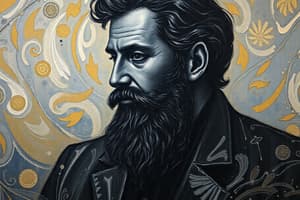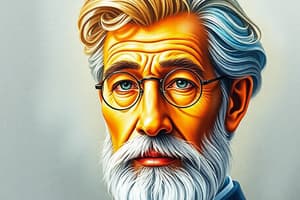Podcast
Questions and Answers
What is personality, according to the passage?
What is personality, according to the passage?
- Our characteristic pattern of thinking, feeling, and acting (correct)
- A random assortment of behaviors
- The color of our eyes
- A person's social security number
What did Sigmund Freud's psychoanalytic theory focus on?
What did Sigmund Freud's psychoanalytic theory focus on?
- Genetics and social class
- Physical appearance and career choice
- Childhood sexuality and unconscious motivations (correct)
- Brain size and education level
What do humanistic theories emphasize, in contrast to psychodynamic theories?
What do humanistic theories emphasize, in contrast to psychodynamic theories?
- The limitations of the unconscious mind
- Our potential for personal growth and self-fulfillment (correct)
- The influence of societal pressures
- The importance of early childhood experiences
What aspects of personality do trait theories examine?
What aspects of personality do trait theories examine?
What do social-cognitive theories focus on?
What do social-cognitive theories focus on?
What common theme do psychodynamic theories share?
What common theme do psychodynamic theories share?
Who is considered the father of psychoanalysis?
Who is considered the father of psychoanalysis?
What did Freud believe was the source of many psychological problems?
What did Freud believe was the source of many psychological problems?
What type of thoughts does Freud suggest are mostly unacceptable?
What type of thoughts does Freud suggest are mostly unacceptable?
What technique did Freud use to explore the unconscious mind?
What technique did Freud use to explore the unconscious mind?
What is the main assumption behind the use of free association in psychoanalysis?
What is the main assumption behind the use of free association in psychoanalysis?
During what stage of life did Freud believe personality development occurs primarily?
During what stage of life did Freud believe personality development occurs primarily?
What is the function of the id, according to Freud?
What is the function of the id, according to Freud?
What is the primary function of the superego, according to Freud?
What is the primary function of the superego, according to Freud?
What is the focus of pleasure during the oral stage, according to Freud?
What is the focus of pleasure during the oral stage, according to Freud?
What is the central conflict of the phallic stage, according to Freud?
What is the central conflict of the phallic stage, according to Freud?
Flashcards are hidden until you start studying
Study Notes
Personality and Psychodynamic Theories
- Personality is a person's characteristic pattern of thinking, feeling, and acting.
- Sigmund Freud's psychoanalytic theory focused on childhood sexuality and unconscious motivations as the two main influences on personality.
Key Theories of Personality
- Humanistic theories emphasize our potential for personal growth and self-fulfillment.
- Trait theories examine characteristic patterns of behavior (traits).
- Social-cognitive theories focus on the interaction between people's traits and social context.
Psychodynamic Theories
- Psychodynamic theories share a common theme of focusing on the unconscious mind and childhood experiences.
- Sigmund Freud is considered the father of psychoanalysis.
- Freud believed that the source of many psychological problems is unresolved conflicts with societal roles.
The Unconscious Mind
- The unconscious, according to Freud, is a reservoir of mostly unacceptable thoughts, wishes, and feelings.
- Freud used free association to explore the unconscious mind, with the assumption that a chain of thoughts leads to repressed memories.
Personality Development
- Freud believed that personality development occurs primarily during the first few years of life.
- Psychodynamic theories propose that our personality is shaped by a conflict between impulse and restraint.
The Id, Ego, and Superego
- The id, according to Freud, strives to satisfy immediate needs and desires.
- The ego operates on the reality principle, mediating between impulses and reality.
- The superego balances impulses with societal norms and strives for moral perfection.
Psychosexual Development
- Freud proposed that psychosexual development occurs through a series of stages.
- During the oral stage (0-18 months), the focus of pleasure is on the mouth (sucking, biting, chewing).
- During the phallic stage (3-6 years), the central conflict is the struggle between the desire for pleasure and the need to conform to societal norms.
Studying That Suits You
Use AI to generate personalized quizzes and flashcards to suit your learning preferences.




